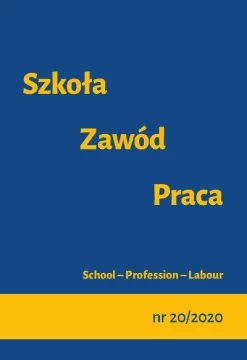Maternal reconstruction of the personality of a portuguese early childhood education teacher ‒ the emergence of grounded theory (résumé from my own research)
DOI:
https://doi.org/10.34767/SZP.2020.02.12Keywords:
early education, early childhood education teacher, grounded theory, personality, qualitative research, reconstructionAbstract
The aim of the exploratory research was developing a grounded theory that could outline the importance of the personality of an early childhood education teacher. The described research process was carried out in accordance with the concept of grounded theory. The empirical material consisted of transcriptions interviews held with mothers of children at an early school age in Portugal. As a result, it was possible to formulate a research hypothesis which led to the conclusions that mothers recognize the importance of the personality of an early childhood education teacher in the educational process, and their statements oscillate around four areas arranged according to the degree of intensity of their statements, namely: build positive relationships, motivate to learn and act, stimulate correct development and maintain the well-being of students.
References
Bertagna, G. (2015). Los profesores del futuro. Coordenadas para su formación | Teachers of tomorrow: premises for a teacher training. Revista Española de Pedagogía, 73(261), 245‒262.
Charmaz, K. (2009). Teoria ugruntowana. Warszawa: Wyd. Nauk. PWN.
Czaja-Chudyba, I., Muchacka, B. (2016). Nauczyciele wczesnej edukacji. Kraków: Petrus.
Durán-Aponte, E., Durán-García, M. (2012). Competencias sociales y las prácticas profesionales. Vivencias y demandas para la formación universitaria actual | Social competences and professional practices: Experiences and demands for current university preparation. Cultura y Educaciόn, 24 (1), 61-76, doi: 10.1174/113564012799740777.
Glaser, B., Strauss, A.L. (1967). The Discovery of Grounded Theory: Strategies for Qualitative Research. Chicago: Aldine.
Glaser, B. (1978). Theoretical Sensitivity: Advances in the Methodology of Grounded Theory. San Francisco: The Sociology Press.
Jefferson, G. (2004). Glossary of Transcript Symbols with an Introduction. In G.H. Lerner (Eds.), Conversation Analysis: Studies from the First Generation (pp.13‒31). Amsterdam: John Benjamins.
Konecki, K.T. (2000). Studia z metodologii badań jakościowych. Teoria ugruntowana. Warszawa: Wyd. Nauk. PWN.
Kozak, S. (2012). Patologia analfabetyzmu emocjonalnego. Przyczyny i skutki braku empatii w rodzinie i w środowisku pracy. Warszawa: Difin.
Kubinowski, D. (2010). Jakościowe badania pedagogiczne, filozofia metodyka, ewaluacja. Lublin: UMCS.
Kvale, S. (2010). Prowadzenie wywiadów. Warszawa: Wyd. Nauk. PWN.
Nowak, J. (2009). O nauczycielu przedszkola w świetle teorii i praktyki pedagogicznej. In B. Kasáčová, M. Cabanová (Eds.), Učiteľ v preprimárnej a primárnej edukácii. Teória, výskum, vývoj (pp.160‒170). Banská Bystrica: PF UMB.
O’Reilly, K., Paper, D., Marx, S. (2012). Demystifying Grounded Theory for Business Research. Organizational Research Methods, 15, 247‒262.
Pilch, T., Bauman, T. (2010). Zasady badań pedagogicznych, strategie ilościowe i jakościowe. Warszawa: Żak.
Rudnicki, P. (2016). Pedagogie małych działań. Krytyczne studium alternatyw edukacyjnych. Wrocław: DSW.
Sáez, A.R. (2017). La prioridad del método en la investigación pedagógica | The priority of method in pedagogical research. Revista Española de Pedagogía, 75 (267), 239‒254, doi: https://doi.org/10.22550/REP75-2-2017-04.
Silverman, D. (2009). Interpretacja danych jakościowych. Metody analizy rozmowy, tekstu i interakcji. Warszawa: Wyd. Nauk. PWN.
Strauss, A.L., Corbin, J. (1990). Basics of Qualitative Research: Grounded Theory Procedures and techniques. London: Sage Publications.
Widera-Wysoczańska, A. (2002). Wykorzystanie metody jakościowej w badaniach psychologia klinicznego. W: M. Straś-Romanowska (red.), Szkice psychologiczne. Doniesienia z badań. Aplikacje. Refleksje (pp.165‒191). Wrocław: UWr.
Zimny, J. (2007). Potrzeba szkolnictwa katolickiego. W: J. Zimny (red.), Szkolnictwo katolickie w myśli Kościoła (pp.10‒22). Sandomierz: Wyd. Diecezjalne.

